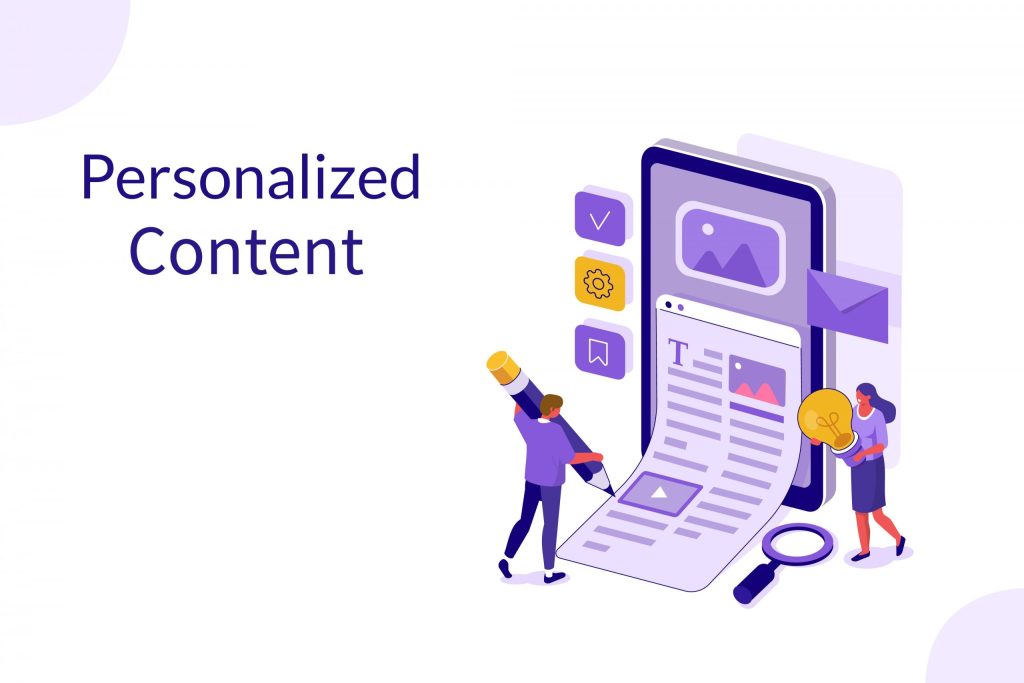With content personalization, firms can now customize their offerings and messages to each customer’s tastes, completely changing the face of e-commerce. Personalized buying experiences are becoming more and more expected as online purchasing keeps growing. Technological developments, such as machine learning and artificial intelligence, which enable more exact targeting and personalization, are the driving forces behind this change. The ability to provide each customer with highly relevant and entertaining material will surely define the future of e-commerce.
Artificial Intelligence in E-Commerce has improved Content Personalization to a great extent. Large-scale data analysis is done by AI algorithms to find trends and forecast customer behavior. AI can make recommendations for goods and services that align with the preferences of its users by predicting what they are likely to purchase. This degree of customization boosts consumer loyalty and conversion rates in addition to enhancing the shopping experience. AI will get to a point where real-time personalization is possible and can adjust to changes in customer behavior. Customers’ buying experience will be further enhanced by this ongoing adaptation, which will guarantee that they receive the most pertinent and timely recommendations.
Using dynamic content is a crucial component of customization of content in e-commerce. A more engaged and interesting experience is produced by dynamic content, which adapts according to user behavior and choices. One way to boost engagement is by sending out tailored emails with product recommendations based on previous purchases. In a similar vein, tailored websites that showcase things of interest have the potential to retain visitors longer. Dynamic content will proliferate as technology develops, providing e-commerce companies with fresh avenues for consumer interaction. In a competitive market, the capacity to craft a special shopping experience for every customer will become a crucial distinction.
The future customization of content must take security and data privacy into account. Ensuring the security of client data is critical as firms gather and examine more of it. Customers expect businesses to handle their data responsibly as they become more conscious of privacy concerns. Subsequent developments in e-commerce personalization will have to strike a compromise between the advantages of customized experiences and the requirement for strong data security protocols. Keeping consumers in control of their data and enforcing transparent data standards are essential to preserving confidence. Companies that can protect privacy while offering customization will have happier, more devoted clients.
Anticipating ahead, the increasing significance of omnichannel experiences will likewise influence the future of content personalization in e-commerce. These days, consumers communicate with brands through a variety of platforms, such as social media, smartphone apps, websites, and physical stores. It is essential to guarantee a smooth and uniform personalized experience throughout each of these interactions. To do this, a unified perspective of the consumer must be created by combining data from multiple sources. Delivering consistent and tailored experiences across all channels will become a crucial competitive advantage as technology advances. Companies will provide a better consumer experience if they can combine their personalization efforts across several platforms with ease.In conclusion, content personalization in e-commerce has a bright future ahead of it that will improve customer satisfaction and spur company expansion. Delivering tailored experiences that live up to customer expectations will require integrating AI, dynamic content, data privacy, and multichannel strategy. Businesses engaged in e-commerce who make these technological investments and place a high value on personalization will be well-positioned to prosper in the rapidly changing digital marketplace. Customization of content is becoming more and more important because it is a fundamental shift in the way organizations interact with their customers, not just a fad. Maintaining competitiveness and satisfying the changing demands of customers will require a persistent dedication to innovation in personalization methods.

